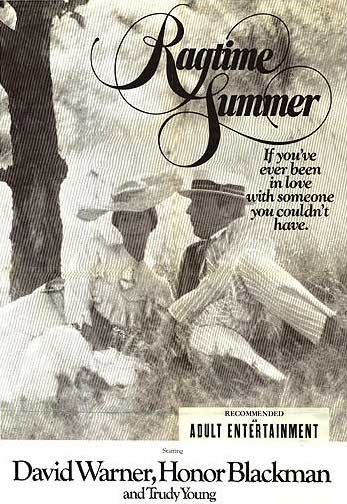Wednesday, May 25, 1977.
RAGTIME SUMMER. Written by Ratch Wallace. Music by Lucio Agostini. Directed by Alan Bridges. Running time: 101 minutes. Mature entertainment.
THERE ONCE WAS A TIME when Canada took pride in being just like England. With a few rather embarrassing exceptions — there were those Bolshies in Winnipeg and Froggies in Quebec — most of the country believed in God and the British Connection.
When Britain went to war, Canada cried “ready, aye, ready!” Between 1914 and 1918, 600,000 Canadians answered the call to the colours. The history books tell us that Canada went to war as a colony and returned a nation.
History books tend to talk like that.
Movies, on the other hand, tell us their stories in more human terms. A single well-made feature film can give us more insight into a subject than a shelf full of research papers.
Ragtime Summer should have been that sort of movie. Set in the summer of 1921, it is the story of two young people coming to grips with responsibility and independence in a small Ontario town.
Sam Carter (Joey Davidson) is a 13-year-old student in Rockfield's English-style private boys' school. Although he will someday take his place in the Canadian Establishment, he's not a particularly good student. He has to stay on through the summer for some extra tutoring.
Clarissa Hogarth (Trudy Young) is the 20-year-old daughter of the school's headmaster (Cec Linder). She has just returned from her first year at a university in the United States.
Clarissa is a prototype of the new woman, sophisticated, self-aware and full of dissatisfaction with life in rural Rockfield. She's lost all interest in her erstwhile boyfriend, Ralph McKinnon (Tim Henry), the loutish son of the local tractor dealer.
Touching both of their lives is that of the school’s new science master. An intense, enigmatic Englishman, Henry Buchanan (David Warner) is a man with a past. Although his academic credentials are impeccable, Buchanan is unemployable in England.
The problem is that his war record contains a prison record. A sensitive soul with an uncommon understanding of events, Buchanan was a conscientious objector.
The boy looks up to Buchanan, a competent, compassionate role model. The girl decides that he must be her first lover. The combination of the their involvements will force all three into painful new growth.
Though being sold as nostalgic romance, Ragtime Summer is rather more ambitious than that. Ratch Wallace, a Canadian actor turned screenwriter, set himself the difficult task of trying to bring an era alive. His story explores the emotional roots of both the 1920s and 1930s, and suggests that a maturing country, like a maturing person, must face both the loss of innocence and a bitter meeting with reality.
Unfortunately, he doesn’t quite pull it off. Though his screenplay contains a number of telling scenes, it too often drifts into facile melodrama. Indeed, in an apparent effort to raise the emotional temperature in his hothouse community, he tosses in a 40ish swinger named Mrs. Boswell (Honor Blackman), an alcoholic, independently-wealthy divorcee who admits to being “a woman with a reputation.”
A character right out of D.H. Lawrence, she takes wicked pride in her open affairs with the school staff. Her presence in the otherwise stuffy Rockfield suggests an incredible tolerance for sexual eccentricity in the Ontario outback. Blackman’s overwrought performance also suggests an imprudent tolerance for hambone acting from director Alan Bridges.
It is Bridges, of course, who must bear the final responsibility for the film's dramatic failure. An Englishman with a background in classical drama, his previous cinematic flirtations include such bland, artificial items as 1973’s The Hireling and Out of Season (1975).
Here, he is trying to evoke a period that he neither understands nor can identify with. Wallace’s script may have started out as discount D.H. Lawrence, but Bridges’s cold direction turns it into bargain basement Ibsen.
The combination undercuts what should have been an effective and affecting film. It's not hard to believe what happens in Ragtime Summer; it's just hard to care.
The above is a restored version of a Province review by Michael Walsh originally published in 1977. For additional information on this archived material, please visit my FAQ.
Afterword: Ratch Wallace represented the youthful excitement of an emerging Canadian film industry in the mid-1970s. Two years before his Ragtime Summer arrived in Vancouver, I’d interviewed the 30-year-old Torontonian about the state of the cinema arts on the occasion of his debut as a feature producer (with director Paul Lynch’s The Hard Part Begins.) You can read that interview here.
Not a popular hit, Ragtime Summer was released in the U.S. as Age of Innocence, a title that may have suggested to some the mildly notorious 1920 Edith Wharton novel, a tale of class conflict in gilded-age New York City. The novel was the inspiration for director Martin Scorsese’s 1993 historical romance. (Also called Age of Innocence, it starred Daniel Day-Lewis, Michelle Pfieffer and Winona Ryder.) It’s also possible that American filmgoers mistook the Canadian feature for a European “art” film. It was 1977, after all, and the U.S. release poster featured a topless Honor Blackman looking anything but innocent. You can view it at the film’s IMDb web page.
